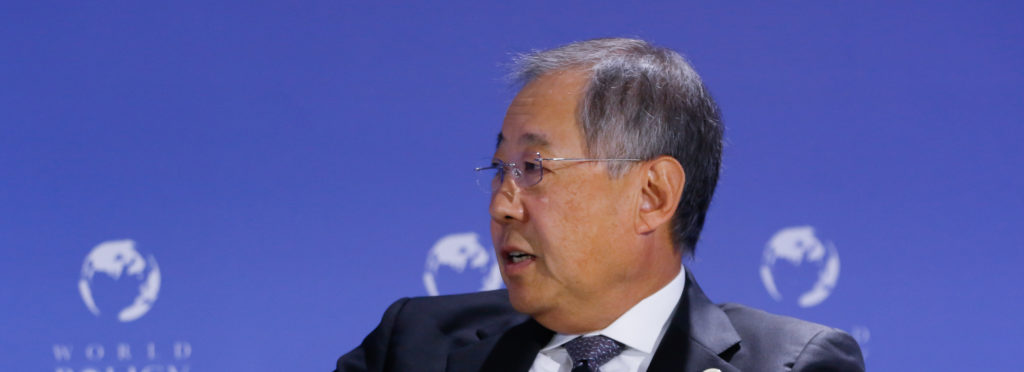Head of South’s top business body says trilateral meetings with peers to be launched.
TOKYO — The top official of South Korea’s biggest business lobby has painted an upbeat picture of trilateral cooperation involving the U.S. and Japan, saying their ties will not waver regardless of the outcome of America’s presidential election.
Jin Roy Ryu, chairman of the Federation of Korean Industries (FKI), said that as things now stand, former Republican President Donald Trump “has an advantage” in the race against Democratic President Joe Biden. If elected, Trump too would welcome solidarity between the three countries, as it brings many benefits, he said.
Ryu, who is also chairman of the copper smelter and defense equipment maker Poongsan, made the remarks in an interview with Nikkei during a visit to Tokyo on Thursday for a meeting between the FKI and the Japan Business Federation, Japan’s biggest business lobby, known as Keidanren.
There could be difficulties to overcome for bilateral ties — whether between South Korea and Japan, between South Korea and the U.S., or between Japan and the U.S. — but Ryu acknowledged that “trilateral solidarity is strong and will continue to be supported” by the U.S. even if Trump returns to the White House.
Ryu also said that “while the Democratic Party supports American companies politically, Trump tends to welcome companies investing in the U.S. regardless of their nationalities.”
Ryu predicted that if the election pits Biden against Trump, the incumbent will outstrip his predecessor in terms of the raw popular vote.
But as things now stand, Trump “has an advantage” in the Electoral College state-by-state count, said Ryu, who has studied in both Japan and the U.S. and has strong personal connections in U.S. political circles.
“South Korea, the U.S. and Japan must unite not only politically but also economically through their businesspeople, which the U.S. also wants strongly,” Ryu said. He added that the FKI, Keidanren and the U.S. Chamber of Commerce are considering regular meetings of business leaders from the three countries, with the first one likely being held in South Korea by the end of this year.
Ryu also said the business communities of South Korea and Japan “need to make efforts to expand and deepen various exchanges” to support the neighbors’ currently improving political ties. He specifically expressed his intention to promote cooperation in finance, information technology, startups and manufacturing.
He said that when he visited Japan for such a meeting five years ago, its participants “looked so serious” due to the deterioration of bilateral ties. But the atmosphere has changed, as the two countries have held a series of dialogues since the resumption of top-level “shuttle diplomacy,” he said.
Based on his experience of organizing a student exchange program between South Korea, the U.S. and Japan at the South Korean high school he serves as chairman of the board of trustees, Ryu also stressed the importance of exchanges, especially between young people.
“Young people who lead the future need to deepen mutual understanding by interacting with each other and learning history,” he said. To that end, he expressed his intention to use a fund backed by the FKI and the Keidanren.
The issue of Korean wartime laborers, who worked for Japanese companies during World War II, is the biggest pending problem in relations between the two countries. As a solution, the South Korean government decided to compensate them through its affiliated foundation.
The South Korean government is soliciting contributions to the foundation from private companies. But although major South Korean steelmaker Posco announced its contribution of 4 billion won ($3 million), no other companies have followed suit yet.
When asked about the position of the FKI, Ryu acknowledged that it is a “difficult case,” as there are too many obstacles, and even if proposes ideas of solutions, “there should be objections.”
He said, “We currently have no choice but to keep quiet.”
Read the article, originally published by Nikkei
https://asia.nikkei.com/Politics/International-relations/Trump-win-wouldn-t-hurt-South-Korea-U.S.-Japan-ties-business-leader

